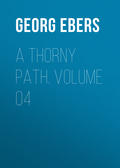
Georg Ebers
The Elixir
As the wishes of his guardians coincided with his own in this particular, he hastened to fulfil them, and his choice fell upon the daughter of an officer of high rank, who had been noticeable at the Rathhaus balls on account of the elegance of her costume.
Frau Schimmel was apprehensive, for according to her ideas, an honourable young woman of good burgher family was better suited to the heir of The Three Kings; yet in reality she considered nothing too good or too beautiful for Zeno, and after she had learned from the officer's servants that their mistress was of a cheerful disposition, and was able with her own skilful hands to dress herself well on very small means, and to keep up an appearance of elegance in her father's house which swarmed with children, she came to the conclusion that Zeno's choice was a wise one.
She therefore gave her consent to his wooing, and at the end of three months the wedding took place with great magnificence, to the sound of drums and trumpets. The young husband went about as if he were borne on wings.
Surely there was no bride in all Saxony so lovely and so beautiful, and when she refused flatly to have Frau Schimmel invited to the wedding feast, he excused her, thinking that her refusal was the result of her aristocratic surroundings and training. The question did not give rise to any open quarrel, for Frau Schimmel of her own accord announced that it was enough for her to pray for the happiness of the young couple in church.
For four weeks after the wedding-day, Zeno continued to wonder that such exquisite bliss could fall to the lot of any mortal in this world, which so many people regarded as a vale of sorrow, and when his passionate dark eyes were reflected in the cooler blue ones of his wife, and she returned his caresses sweetly but without laying aside her distinctive and reserved manner, which he laid to the account of maidenly bashfulness, he felt that no one could be more blessed, and that he was the most enviable of men. So the time passed, and his twenty-fifth birthday was approaching. The young Frau Ueberhell awaited with even greater curiosity than her husband, the disclosure of the contents of the sealed package which Herr Winckler had in charge for his ward.
On the morning of the birthday Frau Rosalie dismissed the housekeeper, whom she kept at a distance, and herself admitted the notary when she saw him approach The Three Kings, which by her wish had been richly decorated with stucco and gilding, and furnished with stable room for Zeno's horse and her two ponies.
The old gentleman brought with him the parcel, as the young couple expected and after saying that unfortunately the written instructions, which Doctor Melchior had given him at the same time with the box, had fallen a victim to the flames, he broke the seals that had fastened the package for so many years, and Rosalie clapped her hands when the beautiful casket of carved ivory mounted in gold came to view.
It was opened with great care, and Zeno took from it a paper which lay on a rose-coloured silk pad and on which Doctor Melchior had written in large Roman characters: "To my son Zeno Ueberhell. To be used according to the directions found in the letter accompanying the casket, afterwards to be given to his eldest son on his twenty-fifth birthday, and thus always to be handed down from first-born to first-born, to the last one, which, please Heaven, will be to the end of Time, in order that the phial, destined to change the aspect of human life, and lead it to its true salvation, may remain forever a priceless heirloom in the Ueberhell family. By means of the accompanying prescription every experienced chemist will be able to make the elixir in any desired quantity. My blessing rest upon you, my son, and upon every Ueberhell who, on his twenty-fifth birthday—that is having reached maturity—shall receive this little bottle and regard it as the most precious of all his possessions."
This inscription Melchior's son read with trembling voice, and he was so deeply moved by the solemnity of his father's words that he did not perceive his young wife lift the cushion from the casket, examine the phial with curiosity, and then, having removed the glass stopper with difficulty, hold the bottle to her dainty little nose.
But she closed the phial as quickly as she had opened for she experienced so strange a sensation, her blood beat through her veins so oddly, that, impelled by some inner force, and regardless of the presence of Herr Winckler, and the tact which she usually displayed, she cried out: "So that, then, is your inheritance! A bit of coloured glass which one could buy in the street for a trifle, and a few brown drops of some stuff which no one knows the use of, now that the directions are burned."
As Zeno, surprised at these shrill notes which he now heard for the first time, in his wife's voice, tried to pacify her, saying that no doubt the liquid possessed marvellous properties, and that they could not blame his sainted father because an unlucky accident had destroyed his elucidation of them, and sought to draw her to him, she pushed him away roughly, and answered with angry scorn: "Sainted, you call the old man! As if I didn't know that he was a master of all sorts of hellish arts and black magic! A fig for such saintship!"
They were bitter words, and, like one who has been wandering in sunshine and suddenly finds himself overwhelmed by blackest night, Zeno felt himself deprived of strength, the floor seemed to rise, and his knees trembled.
He grasped the phial, hoping to recover himself by aid of the pungent odour that escaped from it, and even as he inhaled the contents, light seemed once more to flood the darkness, and very erect, and with a dignity of which he had not hitherto thought himself capable, he listened to Rosalie's further words.
He grew very pale, and it was with difficulty that he restrained himself, but he did not interrupt her as, forced by the power of the elixir, she went on to declare, that she had accepted his offer of marriage merely because he was sufficiently presentable, notwithstanding his humble origin, to enable her to walk or ride with him about the city without feeling humiliated; that she had hoped and expected to find great wealth by means of which as his wife, she could lead the life that she enjoyed, and be able also to help her father to bring up her younger brothers and sisters in a fashion befitting their rank; that on the contrary she had found him only rich enough to secure her own comfortable existence, and for this she had chained herself to a turtle dove whose eternal cooing was beginning to weary her beyond endurance; that now her last hope of the riches, which one had a right to expect in the house of a magician, had vanished, and that if it were not for the gossip of the townsfolk, she would return to her father's house.
With this statement Rosalie stopped and looked around her, frightened by her own frankness, which she now recognized as unwise and fatal to the last degree.
The unlooked-for and dignified reserve of her injured husband, together with his ghastly paleness disturbed her, and her inquietude grew to painful anxiety as he maintained silence. At length he said "I have learned to love you truly and passionately, my wife, and now you show me how you have returned the affection which my heart bestowed upon you. You are right when you accuse me of having laid too much stress upon vain trifles. For that very fault I have been most severely punished, for had I wooed you in woollen, instead of in velvet, I should never have had the misfortune to be bound to a woman like you. Nor was it love that led me to you, but the miserable ambition to bring a nobleman's daughter into my burgher home. So we both deceived each other, and now if you wish to return whence I took you—you may leave my home unhindered."
The young wife buried her face in her hands and answered: "No, no, life is too miserable and poverty-stricken at home and I have suffered too much in the long struggle to keep up appearances. And then what would people say? No, no,—I will do everything that I can to please you."
"Very well, you may stay," he replied gloomily.
Frau Schimmel, who had been in the room for some time, turned to the notary and said: "The Court apothecary used to say that I was stupid, but thirty years ago I foretold what has happened here today."
She then implored Zeno to throw the elixir into the Pleisse, but for the first time he exhibited a will of his own. He put the phial and the document in his father's writing into his breast pocket, and tucking the gray-haired notary under his arm, he left the room.
Frau Schimmel followed his example. Having reached the ground-floor she stopped and, shaking her gray head, murmured: "Doctor Melchior was such a wise man, I wonder he did not order that each of his successors should make the girl of his choice inhale the elixir before he proposed to her. The life I led with Vorkel, and with my second husband Schimmel, who lies beside the first in the churchyard, was hardly perfect, but Zeno's existence will be hell upon earth."
But this time Frau Schimmel was a little wide of the mark in her prophesy. The two young people, for a time, treated each other distantly and coldly, but Fran Rosalie learned to regard her husband with a timid respect that sat well upon her. As for him he was transformed into a stern man since he had inhaled the elixir, and his severe dress seemed but an outward sign of his earnestness. Before the year was out a boy was given to them, and when Rosalie saw him take the little one in his arms and kiss it, she called him to her bedside and whispered: "Forgive me."
He made a sign of pardon, and stooping, kissed her white face, that was still the dearest in the world to him. Then he went to his own room and inhaled the elixir whose properties and effect he had long before learned from Frau Schimmel. He called aloud, as if speaking to another person: "If she be good to the child, I will no longer make her feel how she hurt me, though I can never forget it."
But it was not granted to him to show by his actions that he had forgiven her, for during the night fever supervened, and before morning she died.
Her hot hand had lain in his, just before her heart ceased to beat, and had pressed it, as if in farewell.
Frau Schimmel followed her darling's unfortunate wife shortly afterwards. Her death was a peaceful and happy one, for Zeno held her withered hand, and talked to her of the days when she had dressed him in his beautiful light-blue frocks. He closed her eyes himself, and followed her coffin to the churchyard.
Only Herr Winckler remained to the widower, who lived alone with his son in The Three Kings, and like a father, more than a friend, aided him in his researches concerning the elixir.
They discovered that it produced its effect only on those who were connected with the Ueberhell family. This was a great disappointment to Zeno, for he set a high value upon truth, and had heard from his father's friend what great blessings for mankind the dead man had anticipated from his discovery. All his hopes of using it in his profession to make hardened sinners confess their misdeeds, were therefore, vain. For this purpose it was certainly useless and Zeno and Herr Winckler concluded that the reason why its effect was so limited was because it owed its power to the blood of a child of the Ueberhell race.
That its potency extended to those who married into the Ueberhell house was proved by its effect upon Frau Rosalie. As it had also once vanquished Frau Schimmel, they argued that the Court apothecary must have used other blood beside his own, for he certainly had never been connected with his housekeeper by marriage. What had been intended to benefit the whole world, exercised its influence only in one direction, and on the members of one small family; this grieved the old notary when he recalled the happy and triumphant death-bed of his friend.
The elixir had undoubtedly changed Melchior's son to an incredible extent; from an easily-led, pleasure-loving youth, Zeno became a self- contained man—almost a recluse—and he won for himself the reputation of being one of the severest judges on the Leipsic bench.
High and low doffed their hats to him with respect, but he was not popular.
After he had worked at the Rathhaus long after hours, he would go home alone, and no one sought him out to pass an hour in his company, for everyone feared the rough and brutal frankness of his speech. The gregarious and friendly notary used to wince when he heard his adopted son spoken of as "the hard Ueberhell," or "the sinner's scourge," and he tried his best to make him more human, and to draw him within his circle of friends.
When death overtook Herr Winckler, from whose mouth Zeno used to hear many bitter tirades against the elixir, and Melchior's son found himself entirely alone, and making always more enemies by his irrepressible instinct to speak out what he thought to be the truth, he would sometimes ask himself if it were not better to destroy the elixir, which had brought him nothing but misery, and thus to spare his son and succeeding generations.
But the stern upholder of the law did not feel that he had the right to disobey the instructions of his father. And so the elixir descended to his son, and was given to him on his twenty-fifth birthday by his guardian, for Zeno died before his only child reached that age.
What happened to this second Melchior Ueberhell whose unfortunate history….Here the story broke off. The son of one of my friends had found it in an old chest, when he was playing in the attic of The Three Kings. It was written in a discoloured blank-book, which had escaped the devastations of the mice and insects, because it had lain under a pile of aromatic herbs and drugs that had probably belonged to the shop of the Court apothecary.
Between the last page and the cover of the blank-book, which was confided to me, I found a continuation by a later Ueberhell.
This appendix could hardly have been written earlier than towards the end of the last century, to judge by the paper, the stiff, old-fashioned handwriting and, more surely still, by the fact that the writer mentions vaccination as a new discovery. Inoculation was first tried in 1796, and three years later an institution was opened in London where a Leipsic professor of medicine gave lectures.
This communication is signed: "Doctor Ernst Ueberhell, Professor of Medicine." And runs as follows:
Several centuries have passed since the time of the ancestor to whom we owe the wonderful history of the elixir as written in this book, and preserved from generation to generation in our family.
Many Ueberhells have closed their eyes forever, since then, and even the graves of Dr. Melchior and his beautiful wife Bianca have disappeared, owing to the removal of the burying-ground.
On the other hand the portrait in red crayon of Frau Bianca and the little Zeno is still carefully preserved as a most precious heirloom, and was the picture that inspired my sainted father with the desire to become an artist.
Our forebear Dr. Melchior devoted the best of his energies to the benefit, as he thought, of his race, perhaps indeed of all mankind, and yet his efforts were unavailing, for to my sorrow must I acknowledge that much of the enmity felt towards our family, and the disrepute into which our good old name fell, was caused by the elixir. The majority of Ueberhells were accused of presumption and arrogance, of opiniativeness and pugnacity. Many had made themselves disagreeable to their neighbours by their caustic criticisms and ill-natured complaints, at the same time bringing misfortune upon themselves by a most curious exhibition of their own faults.
The whole race degenerated so rapidly through their unbridled license and lack of consideration for others, that they ceased to be received by the members of the better circles, and there came to be an offensive saying that in Leipsic there were men, women, and Ueberhells.
This dislike and animosity were visited upon one generation after another until finally it affected the worldly prosperity of the family. Even The Three Kings in the Katharinenstrasse which, by the way, had long ceased to be known by that name, was lost to us, and so remained for many years until my sainted father recovered it again, and that the Ueberhells did not fall into even greater distress was due largely to the timidity, nay absolute terror, with which they inspired many people.
From several of my relatives—and they without exception made use of the elixir when they received it on their twenty fifth birthday—I have heard many particulars concerning the experience, but there was only one who ever said that he had been happier and more contented because of it, and that was my sainted father, the painter, Johannes Ueberhell.
He lost his father very early, and was brought up and educated in poverty and distress by his good mother who remained a widow. It was she who sold the last of the jewels and plate that had come down to her from earlier and more prosperous days, in order to make it possible for Johannes to go to Dresden and study under a good master.
He was a virtuous youth, with a simple heart, and a disposition so gay that the unfortunate forgot their sorrow whenever he appeared.
Even as a child—so I have heard my grandmother say—he was so cheerful and contented despite their bitter poverty, that he made up a little prayer for himself in which he used to thank God for having created him.
This man, then, grew up to be truehearted and sincere without the elixir, but he made use of it, none the less, when it came into his possession, and it proved a great blessing to him. As a light-hearted and modest youth—so diffident that he was timid in his intercourse with older persons—he wandered over the Alps, with only fifty thalers in his pocket and a small knapsack on his back, to Rome where he was received into the studio of one of the most distinguished painters, as apprentice. This latter very soon became jealous of the great talent exhibited by my father and a competition occurring, exerted all his influence to keep the prizes from the German competitors and have them awarded to Italian artists of much less merit.







